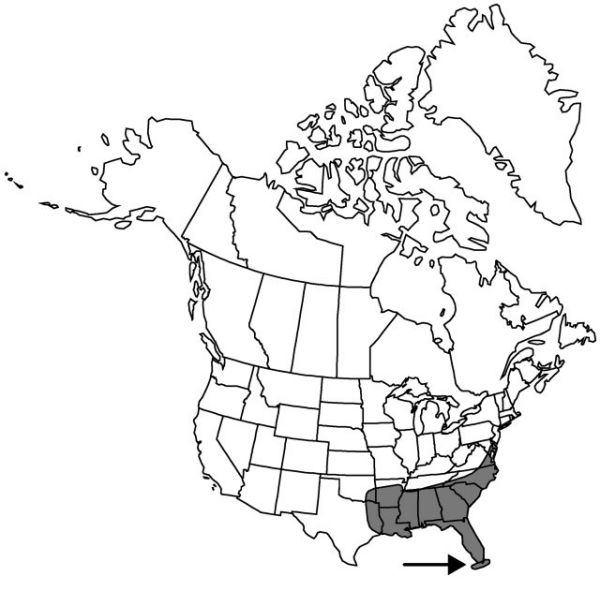Difference between revisions of "Smilax laurifolia"
Sp. Pl. 2: 1030. 1753.
FNA>Volume Importer |
FNA>Volume Importer |
(No difference)
| |
Revision as of 21:46, 16 December 2019
Vines forming extensive colonies; rhizomes irregularly branched, tuberous, woody. Stems perennial, climbing, branching, terete, 5+ m × 15 mm, woody, glaucous, glabrous; prickles dark, flat, to 12 mm, rigid. Leaves evergreen, ± evenly arranged; petiole 0.5–1.5 cm; blade abaxially green, drying to pale brown to brownish green, oblong-elliptic, lance-elliptic, or, sometimes, linear or broadly ovate, not prominently reticulate, 3-veined from base, 7–13 × 1.3–4(–6) cm, coriaceous, not glaucous, glabrous or minutely pubescent abaxially, base attenuate to rounded; margins entire, often revolute, teeth absent; apex acute to rounded, often mucronate. Umbels numerous, axillary to leaves, generally on short branches, 5–12(–25)-flowered, ± open, spherical; peduncle 0.5–1.5 cm, shorter than subtending leaf. Flowers: perianth yellow, cream, or white; tepals 4–5 mm; anthers exceeding filaments; ovule 1 per locule; pedicel 0.5-1 cm. Berries black, ovoid, 5–8 mm, shining, glaucous.
Phenology: Flowering Aug–Oct.
Habitat: Bays, bogs, pocosins, swamp margins, marshy banks
Distribution

Ala., Ark., Del., Fla., Ga., La., Md., Miss., N.C., Okla., S.C., Tenn., Tex., Va., West Indies (Bahamas, Cuba).
Discussion
The stems of Smilax laurifolia are viciously armed.
Selected References
None.